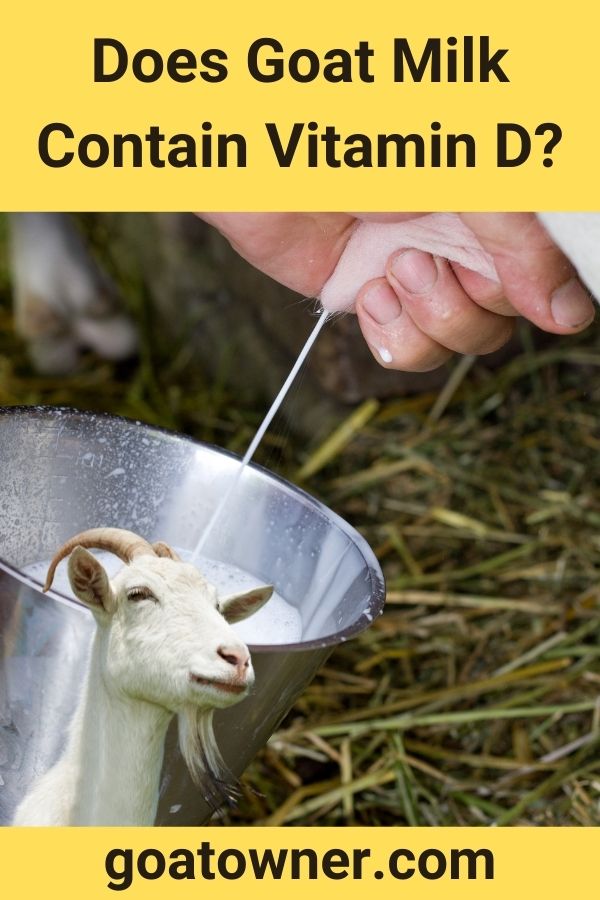While sitting in the sun in my back yard with a friend the other day, we were watching my goats roaming around and he made a remark about the amount of vitamin D we were all soaking up from the sun.
I always guessed I got plenty of vitamin D from the sunlight where I live and had never been worried about getting enough of it in my diet.
Nonetheless, when my friend asked if I knew whether there was vitamin D in goat’s milk, I had to admit I wasn’t sure.
So, I decided to look into it.
Does goat’s milk contain vitamin D?
While goat’s milk does contain trace amounts of vitamin D, it is naturally quite low in it and is therefore not a good source of vitamin D. There are a variety of sources of vitamin D and none of them are much like goat’s milk—foods like oily fish, red meat and egg yolks, and, of course, sunlight.
So, technically, goat’s milk does contain vitamin D.
However, it’s not really enough to make a difference, and you’re going to end up consuming a large variety of other vitamins and minerals but you will not get much vitamin D.
So, let’s look at which milks, if any, do contain large amounts of vitamin D.
Which milk has the most vitamin D?
An important distinction to be aware of, especially if you have your own milking goats and you’re wondering about the presence of vitamin D in their milk, is that a lot of pasteurized milk on store shelves has vitamin D added.
It’s a requirement that it be on the ingredient label.
In the 1930s, it was required to be added to fight the onset of rickets.
So, your own goat’s milk won’t have much vitamin D if you don’t add it.
That said, store bought milks can still be a great source of calcium. 1 cup of fortified whole milk contains around 24% of the daily recommended intake, and so is a great source of vitamin D.
Any fortified milk will contain somewhere in the region of 20-25% of the daily recommended intake.
Then if you look at raw milk, you will see how big the difference is.
Raw cow’s milk contains only trace amounts of vitamin D.
Pasteurized goat’s milk contains around 7% of the daily recommended intake.
Plant-based alternatives are not much different unless they’re fortified.
Unfortified, plant-based milks contain virtually no vitamin D.
When fortified, milk alternatives like soy and almond contain around 25% of the recommended intake.
Almost all processed milk is rich in vitamin D in the US. Raw milk contains virtually none.
What vitamins are in goat’s milk?
Despite their natural lack of vitamin D, goat’s milk is nonetheless rich in essential vitamins.
Goat’s milk is rich in vitamin A, which is essential for the eyes, the immune system, reduces your risk of cancer and supports bone health.
Goat’s milk also contains high amounts of vitamin B1, which is essential for glucose metabolism as it enables the body to use carbohydrates as energy.
It plays a very important role in nerve, muscle and heart function.
Riboflavin, or vitamin B2, also supports the body in doing this and is present in goat’s milk, as does vitamin B-6 and niacin.
Goat’s milk does lack some other important vitamins which you may need to supplement elsewhere in your diet.
These are vitamin E, folic acid, and vitamin B12.
Deficiency in these vitamins can cause mild anemia, so you should be careful to supplement them elsewhere.
So, goat’s milk is an extremely beneficial addition to your diet.
But it doesn’t contain everything you need and unless it’s fortified it won’t contain vitamin D, so let’s look at what does.
| Related Articles |
|---|
What foods contain vitamin D?
Well, first of all, your main source of vitamin D is very likely to not be a food—our skin can absorb vitamin D from sunlight, and if you live in a reasonably sunny area and spend any large amount of time outside each day, you are probably already getting enough vitamin D right there.
If you live somewhere a little gloomier or have to spend a lot of time indoors, you may want to look at a diet that’s high in vitamin D.
One of the best sources in your diet is fatty fish.
Things like tuna, mackerel and salmon all contain large amounts of vitamin D.
If you can’t stand fish, other fortified foods like the ones mentioned could help.
Dairy products, soy milk, even orange juice and many cereals are fortified with vitamin D.
Cheese is also a great option.
Egg yolks, too, are very high in vitamin D.
Eggs throughout the years have been whipped around back and forth in terms of whether or not public health officials recommend them as healthy, but in moderation eggs are packed with healthy benefits and a great source of vitamin D.
Fish is probably your best option for getting vitamin D from foods, if you enjoy fish.
Oily fish store a lot of vitamin D in their liver and fatty tissues, as it helps them metabolize and use the energy in food, just like for us.
If you can’t eat any of these foods, just try and get out in the sun every day!
So, goat’s milk in its natural form doesn’t really contain any vitamin D.
Certainly not enough to be beneficial to our health.
Store bought milks are often high in vitamin D because they have been fortified with the substance.
If you aren’t buying fortified milk, you will need to get your vitamin D elsewhere, either in your diet or just soak it straight up from the sun.

